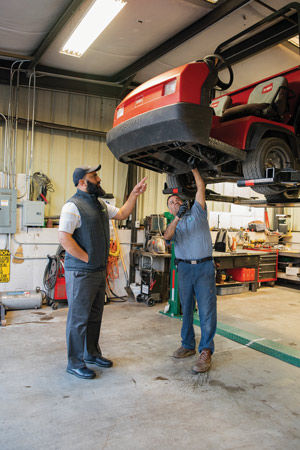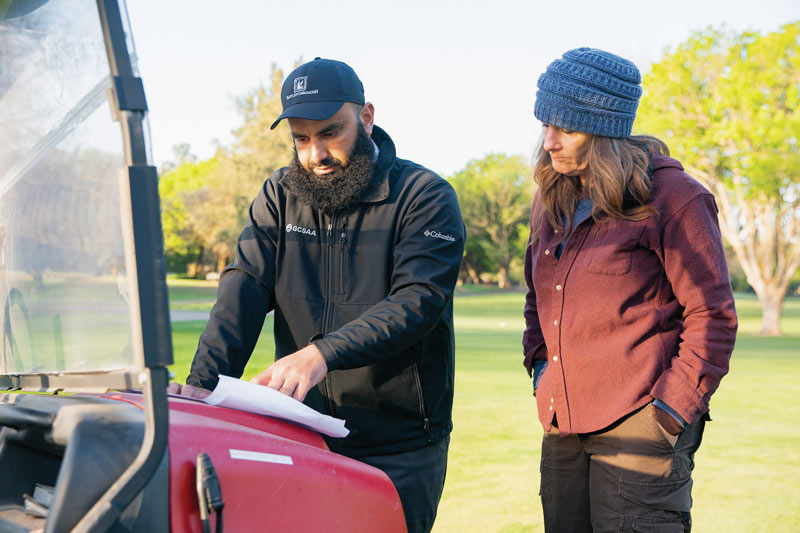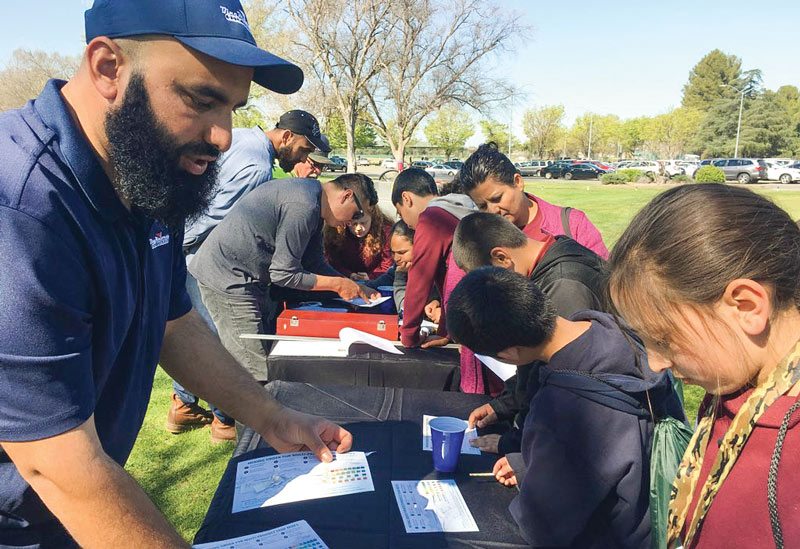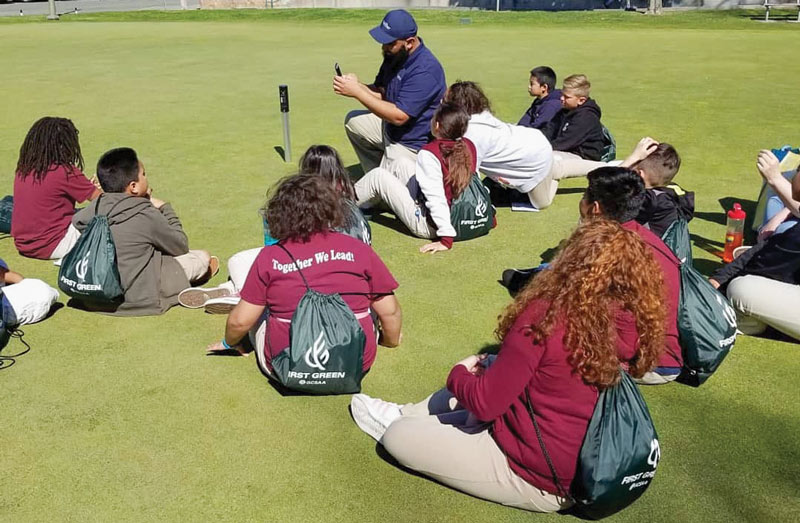
GCSAA Class A superintendent Muhammad Ali oversees 45 holes in Sacramento, Calif. “Basically, he started from the bottom. I think that is why he understands his crew,” says Leo Moreno, Ali’s assistant superintendent at Bing Maloney Golf Complex. Photo by Lauren Alisse/laurenalissephotography.com
To say Muhammad Ali has come a long way would be an understatement.
His life-changing journey to the United States was a frequent flyer’s dream — no nonstop stuff for this air extravaganza. Ali had never been to the U.S. when he departed his home in Pakistan 14 years ago, and his Pakistan-to-Thailand-to-South Korea-to-San Francisco trek set the stage for a new beginning on foreign soil that offered no guarantees. His path was laced with what-ifs and who-knows.
Oh, and then there was this: “I didn’t speak English,” Ali says.
In terms of effort and desire, Ali showed he could speak the language of golf course superintendents. When he interviewed for his first job, at Haggin Oaks Golf Complex in Sacramento, Calif., the interpreter by Ali’s side translated as Sam Samuelson, CGCS, listened. Samuelson quickly realized that Ali was successfully communicating with him regardless of whether he spoke English.
“I could see it in his eyes he had a lot of drive. A desire,” says Samuelson, a 39-year GCSAA member who ultimately hired Ali for the job handling night watering. “You’ve got to be a hustler. Move sprinklers in the dark. A miserable job. You’ve got to want it. In a week, the course looked better than ever. He proved himself more than worthy. I knew I had an all-star here.”
Ali’s story is more like an all-American dream. What he has accomplished brings new meaning to “rise and shine,” as he has made the steady climb from that crew member position working for Samuelson at Haggin Oaks to a GCSAA Class A superintendent in a role that has him overseeing 45 holes. Four years ago, Ali was named superintendent at the 27-hole Bing Maloney Golf Complex, operated by Morton Golf for the city of Sacramento. Last year, he added another municipal facility, Bartley Cavanaugh Golf Course, to his collection of duties. He spends half a day at each facility, and unlike the momentous time he first arrived in America, the five-year GCSAA member no longer has to wonder what each day will bring.
“When I first got here, I was kind of confused what to do,” Ali says. “Now, I don’t have time to get confused.”
A home away from home
Ali has returned to Pakistan four times since he left his homeland for this new adventure. One visit in 2015 lasted several weeks.
His father, Khan, had become ill, and Ali was allowed to take a leave of absence by Haggin Oaks and superintendent Stacy Baker, who had replaced Samuelson (now at WildHawk Golf Club in Sacramento). While Ali describes Pakistan — a country of approximately 220 million people, making it among the five most populous countries in the world — as a beautiful, mountainous and extremely hot country, a major reason why he decided to leave was the country’s health care system, and his work in the U.S. allowed him to help pay for his father’s dialysis. Khan eventually passed away, but he left a legacy for his son that was already playing out at Haggin Oaks.
“He was a real hard worker,” Ali says of his father. “Worked to support his family. If I’m doing something, I will try my best to do it perfect. I don’t want people to have to come in and redo what I just did.”
When Ali returned to the U.S. following his father’s death, his presence was welcomed heartily by Baker. Like Samuelson, Baker instantly recognized something special in Ali. “When I got there, I could see the potential in him. I swore when I became a superintendent I would be teaching, teaching and teaching. If you wanted to learn, I was like an open book,” says Baker, who now works in the construction business. “He gravitated toward the free knowledge. He was like a sponge. He had the drive and wasn’t afraid of challenges. I’m proud of him.”

Right: Ali (left) with equipment manager Carlos Perez. Photo by Lauren Alisse
A Pakistani friend of Ali’s playfully gives him a hard time about his profession. “He teases me that I water grass and cut it. I think it’s a little more than that,” says Ali, 33, who received the Sierra Nevada GCSA’s President’s GrassRoots Award in 2019. “I want my crew to grow along with me and succeed. If I’m not going to help my crew, they’re not going to help me. Let’s succeed together.”
Ali will travel to Pakistan again someday, he says. As for the possibility of making it a permanent home, that isn’t on his radar. Golf has been slow to establish a foothold in the country — according to the website of six-time major champion Nick Faldo, who is currently designing a course in Pakistan, fewer than 50 courses exist there — so job opportunities are scarce. In fact, Ali had never seen a golf course in person until he arrived at Haggin Oaks.
“We lived a good life growing up there, but I wouldn’t say a sustainable life,” Ali says.
However, a love of his native land and the traditional bull racing and horse riding that are popular there remains steadfast in his heart.
Teamwork in Sacramento
Kelli Olsen has a story that’s not all that different from Ali’s.
Although they have more in common now, there was once a time when neither Olsen nor Ali planned on being where they are today. Olsen, a California native, earned an associate degree in sociology and has worked as an insurance agent. Before Ali came overseas, he toiled on the family farm in Pakistan, growing and selling crops such as wheat, corn, tomatoes and squash.
Neither had any golf experience until they found their callings in Sacramento (although Ali did drive the family tractor on the farm, which comes in handy now). A career as a landscaper appealed to Olsen, but she never imagined that type of work would involve a golf course until an opening two years ago at Haggin Oaks caught her eye. Now lead greenkeeper at Bartley Cavanaugh, she recalls a time working side by side with Ali when they went to spray lakeside cattails. Almost in the line of fire near the fairway’s edge, the pair encountered a nozzle issue that might’ve meant a return trip to the maintenance shop. Instead, they put their heads together and resolved the problem. “He found something he needed in the toolbox — a putty knife to tighten down a clamp — and made it work. He was running the show. He did what was needed to get it done,” Olsen says.

Ali (left) with Kelli Olsen, Bartley Cavanaugh Golf Course lead greenkeeper. Photo by Lauren Alisse
At The Master’s University in Santa Clarita, Calif., Olsen played volleyball and basketball before an injury ended her career. Now, she is among a diverse crew at Bartley Cavanaugh that includes three women. Her performance dazzles Ali, who sees major opportunity for Olsen if she sticks with it. “She is a hard worker and is on the right track,” he says. “I think one day she will be a superintendent. Kelli is somebody I really trust.”
Olsen is seriously considering following in Ali’s footsteps. “I like this profession. I see people who are principled, dedicated, open-minded and solve things,” Olsen says. “Muhammad stands out as an example of how this would be an interesting and challenging career to pursue. Everything he has accomplished is well deserved, well earned.”
A learning lab at Bing Maloney Golf Complex
Ali hasn’t limited his efforts to just the maintenance of the golf courses under his watch. He has embraced GCSAA’s First Green program, and Becky Van Nest can attest to its value, even if it meant she had some explaining to do.
A fourth grade teacher at New Joseph Bonnheim Community Charter School in Sacramento, Van Nest brought her class to Bing Maloney in March 2020, before COVID-19 became widespread, to experience the STEM (science, technology, engineering and math) education program that uses golf courses as learning labs. Ali’s son Muazzam was a student in her class. This spring, however, the pandemic prevented a repeat engagement, leaving Van Nest feeling helpless. “(This year’s class) had heard all about it, so they were bummed that we couldn’t go,” she says.


Snapshots from a First Green field trip at Bing Maloney Golf Complex for a local fourth grade class in March 2020. Photos courtesy of Muhammad Ali
Initially, Van Nest questioned whether trying out First Green would be worth it. “To tell you the truth, I was a bit skeptical,” she says. But after experiencing the program last year, she has done a 180. “My students, by far, said it was the best field trip they’d been on. They got to ride around on the golf course, which was neat. They learned about different grasses and that owls are protected on the course. The students didn’t have a chance to get bored,” says Van Nest, whose class also participated in moisture meter demonstrations and got to see equipment up close.
Ali plans to host more First Green events in the future. “Parents came too. Lots of people don’t know how important golf courses can be to the environment. We’re here to teach them,” he says.
Citizenship, family and a home
Ali has obviously taken advantage of educational opportunities. He went to night school to learn English, which is good, because the first few words he picked up were, well ... “They were bad words,” Ali says with a laugh.
What was no joke, though, was how he tackled making the transition to his new life in America. To earn his U.S. citizenship, he spent evenings at the public library prepping for his citizenship exam. In 2010, that work paid off when Ali became an American citizen. “I chose this country to live. I’m here with my heart,” says Ali, who often calls other superintendents, including Baker, to pick their brains as part of his ongoing learning. “More than anyone, he (Baker) has helped me succeed,” Ali says.
Ali has also earned an associate degree in horticulture and a plant production certificate from American River College in Sacramento. He is a certified arborist by the International Society of Arboriculture and has plans to pursue more horticulture education.
Ali and his wife have three children (along with Muazzam, they have another son, Uzair, and a daughter, Mahira). When Ali isn’t at home, they know where he is. In his early years in the business, he would often spend 16 hours a day on the course, intent on making a difference.
“Basically, he started from the bottom. I think that is why he understands his crew,” says Bing Maloney assistant superintendent Leo Moreno, who also didn’t speak English when he came to the U.S. from Mexico. “He’s amazing. He tries to help everybody out.” Ali also sees a bright future for Moreno. “He’s on the right track,” Ali says.
Undoubtedly, Ali has been headed in the right direction. He dreamed big, and those turned out to be some pretty sweet dreams. “My plan was, if it worked out, make enough money to buy my first house,” Ali says. “The dream is alive.”
Name fame
Bing Maloney Golf Complex GCSAA Class A superintendent Muhammad Ali knows Muhammad Ali — lots of them. Just not that Muhammad Ali.
“I know about five or six people named Muhammad Ali,” he says. They, like him, were born in Pakistan. The legendary late boxing champion Muhammad Ali, whose given name was Cassius Clay, was born in Louisville, Ky. He converted to Islam, changed his name and visited Pakistan more than once, including in 1987, one year before superintendent Ali was born.
Asked whether he has ever boxed, Ali was amused by the question. “No. I can’t take that type of beating,” he says. Yet Ali has delivered a knockout when it comes to his job, says his first boss, Sam Samuelson, CGCS. “I play there (Bing Maloney) some weekends. Every time I go, he’s out there running around. That tells you a lot right there,” Samuelson says. “They have no idea what they’ve got in him.”
Howard Richman is GCM’s associate editor.